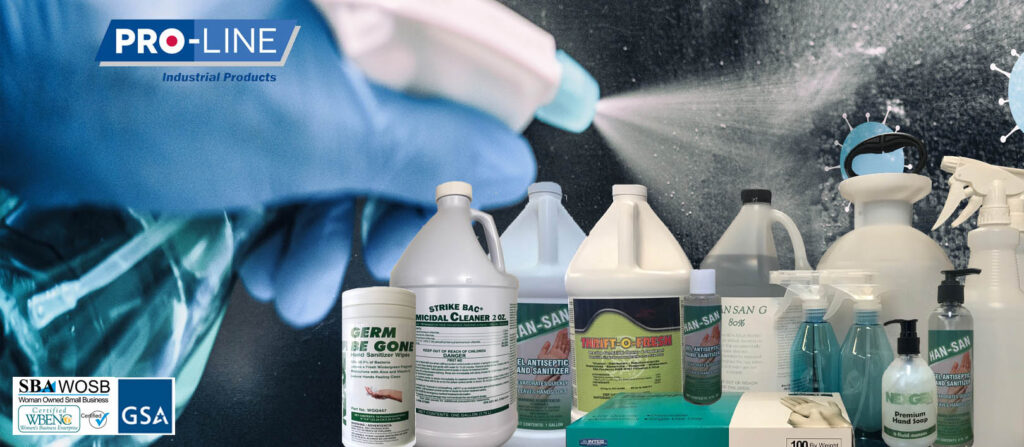Uncategorized
Safety While Using Chemicals
Safety while using chemicals
Cleaning products play an essential role in keeping public facilities and equipment clean and working properly. By safely and effectively removing soils, germs and other contaminants, they prevent the spread of diseases and control allergens, like dust and mold, helping us to stay healthy. Chemicals used in cleaning products, such as laundry detergents, dishwashing products, general purpose cleaners, and degreasers help improve cleaning efficiency, offices and other environments both easier to clean and more hygienic. The misuse of chemicals and cleaning agents can cause health problems and may even damage people and equipment. Knowing how to safely use these products will help to keep you and your staff safe.
Treat all chemicals and cleaning solutions with respect, even if they are non-hazardous, natural or chemical free. Read the label, training information guides and SDS prior to use. Know where these documents are and refer to them often.
Do not mix cleaning products that contain bleach and ammonia. Dangerous gases can be released and can cause severe lung damage. Be sure to have a safe workplace that includes sufficient ventilation/airflow when using cleaning chemicals.
Some other safety tips to keep in mind when using chemicals:
Do not mix cleaning chemicals together – If you do this serious injury or death may occur. Always use clean empty containers for filling.
Know the chemical products you use – Make yourself aware of the color, characteristics and safety directions of the products you use.
Only use cleaning chemicals with a label – Always report any damaged or illegible labels to your supervisor. Ensure the bottle has the correct product in it and is correctly labelled. Replace any labels, which are damaged or illegible.
Avoid splashes. Always wear gloves and all required personal protective equipment as indicated on the SDS. Gloves should be worn at all times when using chemicals, emptying waste, cleaning toilets, cleaning up body secretions and whenever you supervisor instructs you to.
Dilute cleaning chemicals correctly – Always use cleaning chemicals as per the instructions on the label, training information guides and SDS. Mix and measure correctly for the job at hand. Do NOT overuse chemical concentrates when diluting. More chemical does not always do a better job, but the right amount will. If you have access to chemical dispensing equipment, do NOT use it unless you know how to safely operate the system. Important: When manually diluting cleaning chemicals always add water to the bottle or bucket first, then add the chemical next. This minimizes the risk of the concentrated cleaning chemical splashing back at you.
Use the right cleaning chemical for the job – Always use the right cleaning chemicals for the right job. If in doubt as to the correct use of the chemical, do NOT use it or reach out to your chemical representative with questions.
Dealing with cleaning chemical drums and bottles – Seal all containers when not in use. Do NOT leave any cleaning chemical where the general public might have access. Do NOT use old drink bottles or food containers to store cleaning chemicals. Mix up fresh solution for each job so you know the dilution ratios are correct.
Return cleaning solutions after use – When finished with chemicals, wipe down the bottle and store away safely in the chemical cupboard. Keep work and storage areas clean and uncluttered.
Know how cleaning chemicals can enter your body and protect yourself – Chemicals can enter your body by absorption (direct contact), inhalation and ingestion. Personal Protection Equipment is always recommended.
In the case of accidents, Act Immediately! – Report all spills, accidents and safety problems as soon as possible. Ensure spill kits are available and easily accessible. Remove spills as per SDS directions. If unable to contain spills safely report the issue to your supervisor or management immediately. Safety signs must always be used; whenever a floor surface is wet the risk of a slip and fall accident increases and people need to be warned.
Ensure first aid kits are easily accessible
Store and stack cleaning chemicals safely – Stacking chemical drums and boxes too high is unsafe and may cause damage. It is advisable to store powders above liquids. Ensure chemicals are stored in a cool, well-ventilated area away from direct sunlight and out of the reach of children.
Wash hands – Always wash your hands regularly and after using chemicals even if gloves were worn. Good hygiene practices and regular use of hand soap and sanitizer is also recommended.
Ventilation – Ensure there is good ventilation in the storeroom and when you are using cleaning chemicals. Extra caution should always be exercised when using any kind of spray in a confined space.
No smoking – Do not smoke anywhere near cleaning chemicals or whilst you are using chemicals.
Food safety – Do not use any chemicals near food unless they are for a food related task.
Proper lifting techniques – Bend your knees not your back. Avoid any heavy lifting and seek assistance when necessary.
Use common sense – Safety is in your hands. Take responsibility for your actions, work safely and protect yourself along with those around you.
Contact your local government for information about disposing of unwanted chemicals.

